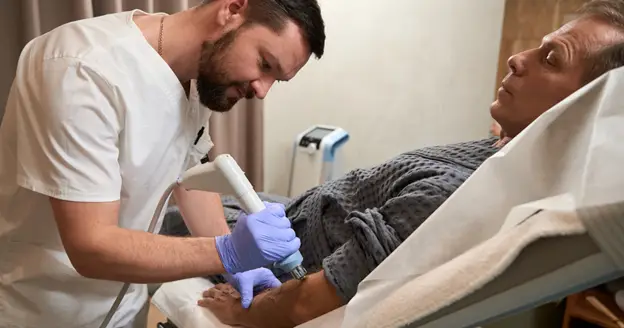Some people ask, will endoscopy show pancreatic cancer? This post explains what endoscopy can and can’t show and what to expect if you’re getting tested.
When your stomach hurts or something just doesn’t feel right in your gut, it can be pretty scary.
And when the doctor starts talking about tests like an endoscopy, it can feel even worse.
You might start asking yourself big questions, like: Will endoscopy show pancreatic cancer?
That’s a hard one. But don’t worry—I’ll explain everything.
It’s totally normal to feel nervous or confused about medical stuff, especially when it involves organs you can’t see or feel, like your pancreas.
I am sure you are feeling stressed about it. That’s okay.
A lot of people don’t know what endoscopy really shows, what it can miss, or why doctors use it in the first place.
That’s okay. Let’s talk through it step by step.
What Is an Endoscopy?
First, let’s make sure we’re all on the same page.
An endoscopy is a test where the doctor uses a thin, flexible tube with a camera on the end to see what will be listed below.
This tube is connected from your throat and into your stomach and small intestine.
The goal is to check the inside of your digestive system to see if anything looks wrong.
Here’s what it helps doctors see:
- The esophagus
- The stomach
- The top part of the small intestine
It can show things like ulcers, swelling, bleeding, or tumors in those areas.
But the pancreas? That’s where things get tricky.
So, Will Endoscopy Show Pancreatic Cancer?
Well, I’ll say not really.
The pancreas sits behind the stomach. That means a regular endoscopy can’t really see it directly.
So, if you’re asking, will endoscopy show pancreatic cancer? The truth is: sometimes, but not clearly.
A regular upper endoscopy might spot signs related to pancreatic cancer, like a blockage or swelling in the small intestine.
But it usually can’t give a clear view of the pancreas itself.
If the doctor is really worried about pancreatic cancer, they might do a special kind of endoscopy called an Endoscopic Ultrasound (EUS).
This lets them look closer at the pancreas using sound waves from inside your body.
So again—a normal endoscopy isn’t the best test to find pancreatic cancer, but it might lead your doctor to do more tests if they notice something unusual.
What Tests Are Better for Finding Pancreatic Cancer?
If your doctor wants to get a better look at your pancreas, they might use:
- Endoscopic Ultrasound (EUS): As we just mentioned, this is a more advanced test. It gives better images of the pancreas from inside your body.
- CT Scan: This is like a super-detailed X-ray. It can show if there are any masses or problems with the pancreas.
- MRI or MRCP: These tests also give pictures of the pancreas and nearby organs. MRCP is especially good at looking at the bile ducts and pancreas together.
- Blood Tests: Sometimes, doctors will check for certain markers in the blood that might mean there’s a problem with the pancreas.
So, if you’re feeling sick and your doctor thinks something might be wrong with your pancreas, they probably won’t stop at just an endoscopy.
Why Do Doctors Use Endoscopy At All?

Even though it might not give a perfect view of the pancreas, endoscopy is still helpful.
It can help check:
- If your symptoms are coming from something else like acid reflux, ulcers, or a stomach infection.
- If the upper digestive system is irritated or blocked.
- If there’s bleeding inside.
Plus, during an endoscopy, doctors can take tiny samples (called biopsies) to test for different problems. Sometimes that’s enough to figure out what’s going on.
What If Your Doctor Recommends a Colonoscopy Too?
Sometimes, if your symptoms involve your whole digestive system, the doctor might suggest checking the lower part of your gut too.
That’s called a colonoscopy. It checks your colon and rectum. If you’re nearby, you can book a colonoscopy bethesda appointment for expert care.
Both tests help doctors put the full puzzle together. Because let’s face it—when your stomach or gut hurts, the cause could be almost anywhere along the way.
What Should You Ask Your Gastroenterologist?
Gastroenterologist is a doctor who works on the stomach and intestine problems. If you’re seeing one, it’s okay to ask questions.
You don’t need to pretend to understand everything. They’re used to breaking things down for patients.
Some good questions to ask are:
- Do I need an endoscopy or another test?
- Can you explain what you’re looking for?
- If the endoscopy doesn’t show the pancreas, what test will?
These questions help you feel more in control. And honestly, if you’ve been feeling sick or scared, you deserve some straight answers.
You can also find helpful info from trusted sources like Johns Hopkins Medicine, which explains how pancreatic cancer is diagnosed and treated.
What Does It Feel Like to Get an Endoscopy?
Okay, let’s talk about the test itself. Most people are worried about how it will feel. Totally fair.
Here’s what usually happens:
- You’ll get medicine to make you sleepy (called sedation).
- You won’t feel the tube going down your throat.
- The whole thing takes about 15–30 minutes.
- You’ll need someone to drive you home after.
Some people feel a little sore throat later, but that goes away fast.
And yes—it feels a little scary at first. But many people say it wasn’t nearly as bad as they thought.
What If You Feel Guilty for Waiting?
Let’s take a second here. If you’ve been ignoring stomach pain or putting off seeing the doctor, I get it.
A lot of people do the same thing. Life is busy. It’s easy to push health stuff to the side.
But if you’re still asking if endoscopy shows pancreatic cancer, that means it’s on your mind. And maybe it’s time to get checked.
Don’t beat yourself up for waiting. What matters is what you do now.
Even if it turns out to be something small, you’ll feel better knowing for sure.
How Do You Find a Good Doctor?

Start simple. Search for a gastroenterologist near me or endoscopy clinic in your area. Look at the reviews. Ask your regular doctor if they can recommend someone.
If you live near Bethesda, you can also search for gastroenterologists near me, and you’ll likely find helpful clinics nearby.
A good doctor won’t make you feel rushed or dumb for asking questions. If they do? Find someone else.
You can also check trusted sources like the American College of Gastroenterology for lists of certified specialists.
Final Thoughts
To wrap it up, here’s the truth: If you’re asking, “Will endoscopy show pancreatic cancer,” the answer is not always.
A regular endoscopy usually doesn’t give a full view of the pancreas.
But it might give doctors clues. And if they see something that looks off, they’ll order more tests.
Don’t stress alone about this. You’re not weak for being scared. You’re not lazy if you wait to see someone. Just take the next step, even if it’s small.
If you have stomach pain that won’t go away, or you just feel “off,” it’s worth talking to a gastroenterologist.
Even if it’s nothing serious, your peace of mind is worth it.…

















 In the area of
In the area of